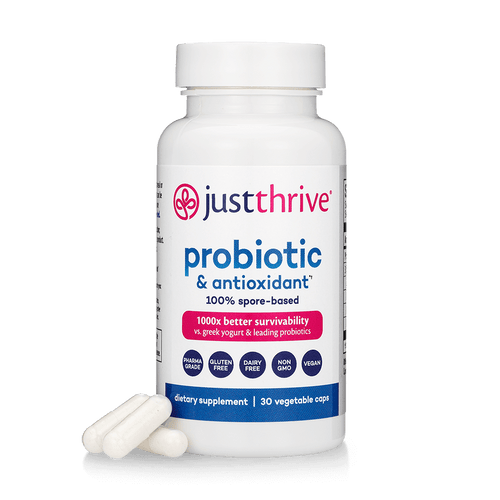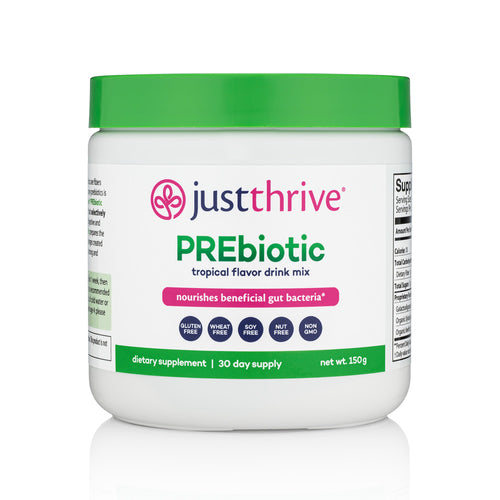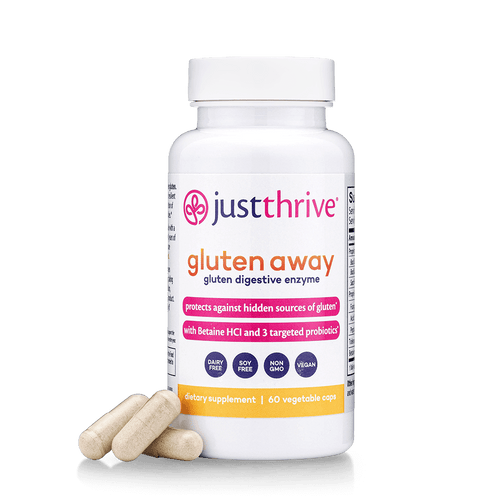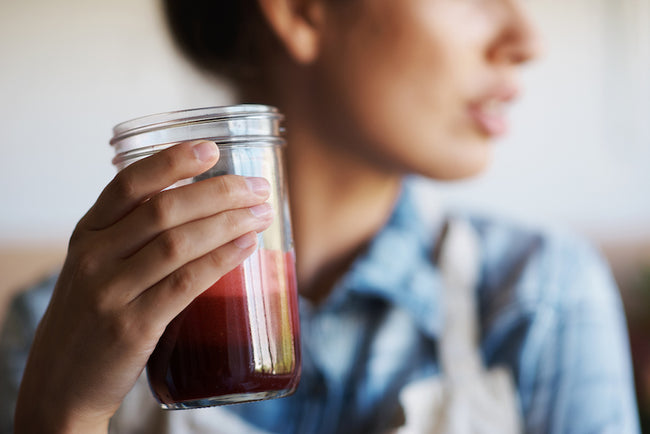Let’s be honest: most kids are a hotbed for germs. Popping items from the floor into their mouths…dragging their hands along public surfaces…sharing toys, snacks, and desks at school…wearing their favorite clothes several days in a row…
No matter how much soap or hand gel they use, children will be teeming with bacteria!
And that’s actually a good thing. You want your kids to have bacteria—as long as it’s “good” bacteria.
But when it’s not the right kind of bacteria, it’s time to step in. Probiotics can restore the correct balance of bacteria in your child’s body and support their overall health and wellness.
Let’s explore probiotics for kids, including the pros, cons, and side effects, probiotic-rich foods, and how Just Thrive probiotic supplements can help support your child’s (and your entire family’s) immune, digestive, and emotional health.
Do Kids Need Probiotics?
In a nutshell: yes! Although we’re focusing on kids, we all need probiotics.
Just like adults, kids' bodies are crawling with microbes (bacteria, fungi, yeast, and more). In fact, regardless of hygiene and “germy” behavior, there are not millions but trillions of microbes on your child’s body, including their mouth, nose, skin, and gut.
And it’s the bacteria in the gut that concerns us the most.
Your child’s gut microbiome (where the bacterial colonies live) contains two very different types of bacteria:
- Beneficial bacteria: the good bacteria
- Pathogenic bacteria: the bad bacteria
Beneficial and pathogenic bacteria coexist in a delicate balance, competing for space in the gut microbiome. When one type of bacteria flourishes, it crowds out the other type.
If it’s the beneficial bacteria that are dominating the gut microbiome, then that’s a good thing. Your child will be healthy and happy, free of the digestive and other health issues associated with an imbalanced gut.
Unfortunately, for most children—and adults—that’s not the case. Far more common is the opposite situation, where the “bad” bacteria is present in larger, stronger quantities. This condition, called dysbiosis, is the norm for most people. And here’s the thing: Your child could be experiencing dysbiosis right now, and you might not even know it!
Probiotic Backup to the Rescue
So, how do you keep your child’s gut microbiome in healthy balance and allow the good bacteria to flourish? Call in some probiotic backup.
Quality probiotic products contain living microorganisms just like the ones that occur naturally in our bodies. When added to your child’s diet via food, drinks, or supplements, they promote the growth of beneficial bacteria and maintain healthy balance in the gut.
Why Kids Need Probiotics
Everyone experiences proliferation of bad bacteria in our gut microbiomes, meaning we ALL could benefit from added probiotic TLC. But there are some additional reasons why children, in particular, reap fantastic rewards from the regular intake of quality probiotics.

Taking Too Many Antibiotics
Remember how we talked about the “germiness” of kids? Well, not all of those germs are good ones! As a result, children are treated with antibiotics much more often than adults. [1]
And while those antibiotics kill off the bad bacteria, they also eliminate the colonies of good bacteria. Probiotics help your child’s body restore good bacteria before the bad ones have a chance to “take over” their gut.
Antibiotics are also known to cause digestive side effects, including nausea, vomiting, bloating, indigestion, and diarrhea. Giving your child the right gut support after (and during) a round of antibiotics can help ease these and other GI issues that might occur.
Refusal to Potty Train
Although it seems simple and natural, potty training is actually quite stressful for children. Many children spend weeks or even months refusing to have a bowel movement on the toilet. Over time, this can cause digestive issues, especially constipation and painful bowel movements.
If you find yourself in this situation, probiotics might be a nearly-magical game-changer. For one thing, they’ll keep things “moving along” so your potty-training child will feel the “need to go.” And probiotics will also help keep stool soft, so when your child does go, it won’t hurt (which would make them even more reluctant to sit on the toilet the next time).
Luckily, quality probiotics can be taken by kids of any age, including toddlers.
Overworked Immune System
Believe it or not, 70-80% of your child’s immune system [2] is found in their gut. Not surprisingly, this means that a healthy, balanced gut microbiome is essential for their immune system to effectively do its job in protecting the body and keeping it healthy.
There are two main parts to the immune system.
- The innate immune system is the one your child is born with. It leaps into action whenever it senses an invader.
- The acquired immune system develops over time. For each invader your child fights off, it creates antibodies to protect it the next time.
The acquired immune system takes years to develop—leaving your child vulnerable to a host of childhood illnesses.
But probiotics strengthen the beneficial bacteria colonies, rebalance the gut microbiome, and support the immune system contained in the digestive tract.
In fact, a trial in Mexico [3] showed that daycare attendees who took a probiotic daily for three months had significantly more positive outcomes than those who did not.

Probiotics For Younger Children, Pregnancy, and Breastfeeding
How young is too young for probiotics? The answer may surprise you: even unborn children can benefit from probiotics, when taken by their mother.
An essential part of a healthy pregnancy is keeping your microbiome balanced. This encourages strong immunity, drives optimal blood sugar levels, supports your baby’s brain development, and even dictates your child’s healthy bacteria.
(Note: Expectant mothers who take probiotics pass these helpful microbes along to their unborn children. If you decide to breastfeed, probiotics are also passed to your baby this way.)
You can keep your gut microbiome in healthy balance during pregnancy, breastfeeding, and beyond with high quality probiotics and targeted prebiotics that feed only beneficial bacteria.
Another study [4] shows that giving infants under the age of three months probiotics can help keep them healthy and even avoid many of the common newborn issues like spitting up, colic, and constipation.
For children this young, probiotics can be added to infant formula. [5] Once they are old enough, it can be given in baby food by opening capsules and mixing it in or as a supplement. For children under 3, please consult your healthcare practitioner.
Signs That Your Child Needs Probiotics
Because probiotics are good for all of us, it’s not necessary to look for signs that your child needs probiotics. You can go ahead and add them to their diet to keep them in tip-top health.
But, there are some clear signs that your child definitely needs to be taking probiotics.
These are some of the most common red flags of an unbalanced gut microbiome [6]:
- Bloating
- Constipation
- Diarrhea
- Fatigue
- Gas
- Bad breath
- Increased stress
- Mood issues
- Skin issues, such as redness or blemishes
- Sugar cravings
- Trouble sleeping
- Unexplained weight problems
If you notice any of these signs in your child and can’t pinpoint the reason why, or notice multiple signs, there’s a good chance your child would benefit from taking a quality probiotic.
How to Choose the Best Probiotic For Kids
There are two ways to add probiotics to your child’s regular routine: through foods or with supplements. The method you choose will depend largely on what your child likes to eat, and how much.

Probiotic Food
A good way to introduce your child to probiotics is by slowly adding them to their diet through probiotic-rich food and drinks.
Here are some of the most common probiotic-friendly foods and drinks:
- Kefir
- Kimchi
- Kombucha
- Miso
- Sauerkraut
- Soft cheeses (only certain varieties)
- Tempeh
- Non-dairy yogurts (look for probiotics on the label)
A quick glance at the list will show you that most of these foods and drinks are fermented. That’s because the fermentation process itself creates an environment that encourages the growth of beneficial bacteria.
Unfortunately, the fermentation process also leaves behind a distinct—and quite strong—taste and smell that won’t appeal to all taste buds. Your best bet might be to try another approach.
Supplements
With kids being such notoriously picky eaters, you might have a battle on your hands convincing your child to eat probiotic foods. Rather than fight them on it, you can opt for probiotic supplements instead.
If your child is younger or is not comfortable taking a pill, Just Thrive Probiotic capsules can be opened and mixed with food or drink. Remember our Probiotic can withstand high temperatures without losing potency, so you can even bake the Probiotic into a muffin and make it a treat.
Another reason to choose supplements is portion sizes. Your child is probably eating much smaller meals than you are. This means that they’ll be getting much less probiotics from food, too. Getting probiotics through supplements means that your child will be getting an optimal dose of this hugely beneficial gut support.
There are two main components that make up an effective probiotic supplement for kids—or anyone—strain and survivability.
Strain
The most effective strain of probiotics is a spore-based Bacillus strain. These probiotics are composed of microorganisms that occur naturally in soil. And who are we to argue with Mother Nature?
Just Thrive Probiotic contains the proprietary strain, Bacillus Indicus HU36TM, which produces antioxidants directly in the digestive system where they can be best absorbed by your body, as well as three other Bacillus strains that support immune, digestive, and emotional health.
Survivability
On its way to your child’s gut microbiome, the probiotic needs to pass through a harsh environment that contains bile, digestive enzymes, stomach acids, and more. Not an easy task! Just Thrive Probiotic has 1,000 times the survivability of other probiotics, including those found in probiotic-rich foods.
Support Your Child’s Gut Health With Just Thrive Probiotic
Regardless of whether or not your child is showing all the signs that they need probiotics, they’ll surely benefit from taking them.
Probiotic-friendly foods are great for overall health, but usually not enough on their own. With the addition of Just Thrive Probiotic, you can give your kids the support they need to live their happiest, healthiest life.
Just Thrive is safe for kids of all ages, but if your child is under 8, we recommend starting with half a capsule sprinkled on their food, or in a glass of water or juice. Kids won’t even know it’s there since these strains are tasteless, colorless, and odorless. And remember, even pregnant and breastfeeding mothers can pass along probiotic benefits to their babies, so make sure to nurture your own microbiome as well!
Our formulations are all-natural, non-GMO, and made WITHOUT soy, dairy, sugar, salt, corn, tree nuts, or gluten—because ingredients matter, and your child deserves the best!
>> Try Just Thrive Probiotic TODAY.
And remember…
All Just Thrive purchases are COMPLETELY covered by our Bottom of the Bottle, 100% money back guarantee.
That means you can give Just Thrive Probiotic a try, and if for some reason you don’t see a difference, simply ask for a full refund at any time... Whether it’s 2 weeks, 2 months or 2 years… Even if the bottle is empty!
Sources:
- https://pubmed.ncbi.nlm.nih.gov/31926085/
- https://connect.uclahealth.org/2021/03/19/want-to-boost-immunity-look-to-the-gut/
- https://www.reuters.com/article/us-probiotic-infections/probiotic-reduces-risk-of-infections-for-preschoolers-idUSBREA2K1SP20140321
- https://pubmed.ncbi.nlm.nih.gov/24100440/
- https://www.aafp.org/pubs/afp/issues/2011/0401/p849.html
- https://carolinadigestive.com/blog-post/the-signs-and-symptoms-of-an-unhealthy-gut














